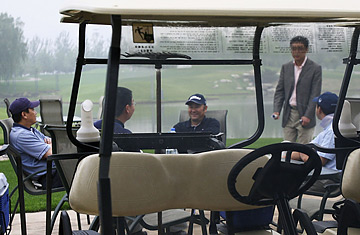
Golfers relax at a tournament arranged for the economic elite in Beijing, China.
"Even a lot of the ladies play now," Simon Leung assured me on a recent Saturday on the China side of the border. A Hong Kong insurance salesman, Leung goes golfing in China most weekends, storing his clubs in the border post's small pro shop squeezed between the bathrooms and the duty-free liquor store, selling golf shoes, clubs, tees and sweater vests to rookies looking to outfit themselves in a hurry. "It's become a common game. People can afford to play."
Watching my fellow passengers lug 20 pounds of clubs in 80 percent humidity, I rode a shuttle bus from the border to Palm Island Resort, a "Thai-inspired" compound outside the city of Shenzhen. Besides the requisite condos, hotels, spas and clubhouses, Palm Island has its own astronomy tower, organic farm and war-themed paintball course. "The mainland on the whole is gradually improving. Just look at the roads," said a fellow passenger as our bus crossed the semi-tropical landscape. He and his wife have been Palm Island members for five years. "It's safer, but it's still not safe."
"We would never take a taxi," his wife agreed.
Nearly 10 years after Hong Kong's handover to China, its golfers are beginning to feel at home visiting the 60 golf clubs on in neighboring Guangdong province. Bruce Chan, whose Golf 007 company books an average of 1,500 golfing trips to the mainland every weekend, notes that when he first started playing there in 1995, "people would go play and get out as soon as possible." Now, he says, they stay.
Things were nothing if not safe inside the gated lotus-strewn world of Palm Island. Members sat drinking beer out of heavy glass mugs on the clubhouse's Thai-style patio overlooking a picturesque driving range. The only lady in the ladies-only spa sipped the bird's nest soup after her treatment, watched by a half-dozen uniformed staff. Beyond the compound's edges, towers of new housing units punctuated the surrounding city's otherwise flat horizon. The distant hammer of construction was interrupted only by the laconic purr of battery-powered golf carts that pass through Palm Island's otherwise empty residential streets.
Although such golfing facilities attest to the rising wealth of China's emerging middle class, the sport is still in its infancy here with fewer than 350 courses in the whole country, compared with some 20,000 in the U.S. The government in Beijing seems to swing between wanting to encourage golf and being wary of the game's bourgeois flavor. The authorities have, for example, imposed a moratorium on building new, unapproved courses, which the China Golf Association said was initiated because China doesn't have enough land to support the courses. Though that's a roadblock that often goes unobserved, it can still slow things down. And with so few courses, golf indeed remains a game for the social elite, as it was 30 years ago in North America and Europe.
But for those who spend their weeks hunched over desks in Hong Kong, the lure of Guangdong's fairways is unmistakable: "What do you do in Hong Kong over the weekend anyway?" says Golf 007's Chan. "Friday you go out and get pissed. Saturday you go out for a drink with the boys. Sunday you're hung over. In China, you go and see different places. Do something nice."
